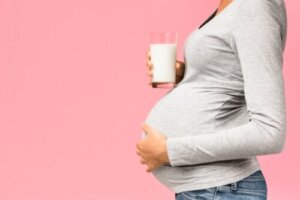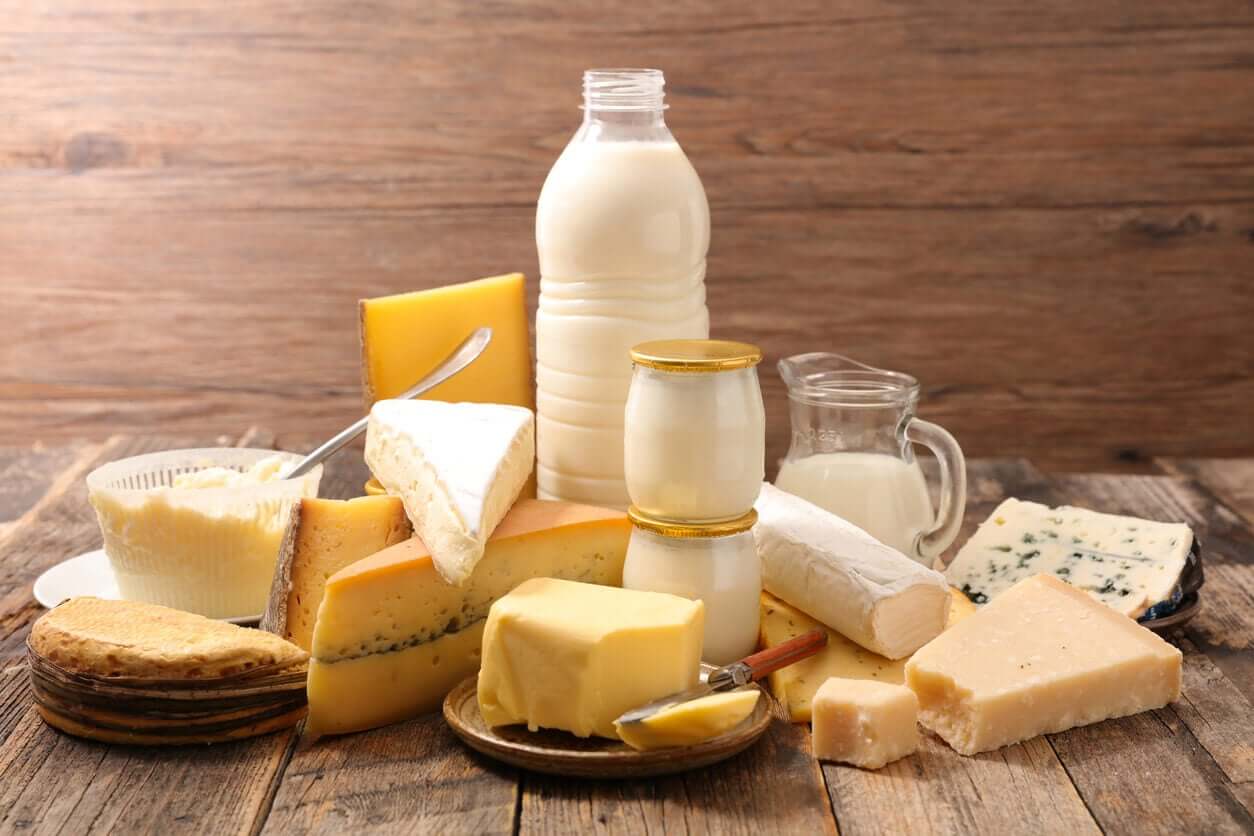Why Do Pregnant Women Need to Drink Milk?


Written and verified by the nutritionist Silvia Zaragoza
Maintaining an adequate diet during pregnancy is very important for the development of the baby. It has to provide enough nutrients and be as healthy as possible. In this sense, it’s very important for pregnant women to drink milk. Keep reading to find out why.
Milk, a complete food
Milk is considered one of the greatest sources of calcium. However, it also contains animal protein, fat, vitamin D, potassium, and magnesium.
At present, people are drinking less milk, for various reasons. In fact, the recommended dairy intake, which consists of 3 or 4 servings per day, is barely met.
One of the reasons for its exclusion from the dietary guideline is that it contains a sugar called lactose, to which 30% of the population is intolerant. However, there are options that are lactose-free or with a low percentage of this carbohydrate.
Milk is one of the most popular dairy products and together, this group contributes to the formation, growth, and proper development of bones. However, this isn’t the only benefit you get when you drink milk. Here are some more advantages.

The growth of babies suggests the need for pregnant women to drink milk
The vast majority of studies that analyze the benefits of milk for the health of pregnant women are oriented toward fetal growth. In fact, several reviews have highlighted the positive effects of the consumption of this food on the anthropometry of the unborn baby.
Birth weight
According to a systematic review published in Food and nutrition research, the relationship between daily milk consumption and the growth of the baby was not entirely clear, due to the differences between the variables considered in the different studies. However, 4 of the included studies found positive associations.
Years later, in 2017, a prospective study was conducted involving Portuguese women, published in the Obesity Research and Clinical Practice. This trial demonstrated the association between the level of milk consumption in the first trimester and the increase in weight and head circumference of the baby at birth.
Likewise, it was determined that drinking more than 3 cups a day produces a greater weight gain in the child, having to do with protein intake.
Read more: Why Do Pediatricians Measure Your Baby’s Head at Birth?
Proper weight for gestational age at birth
Researchers also look at relationship between the baby’s weight for gestational age and maternal milk consumption.
On the one hand, a Spanish study published in the European Journal of Clinical Nutrition in 2019 didn’t find significant associations between maternal milk consumption and weight for gestational age.
However, on the other hand, a study in China that same year showed a significant association between milk consumption during the second trimester and a reduction in the risk of high or low weight for gestational age.
Weight for baby’s size
Finally, other studies evaluated the weight in relation to the femoral length of the fetus, which is the parameter doctors use to estimate the baby’s height. The results showed a direct relationship between the mothers’ milk consumption and the height of their babies. Consequently, experts recommend an intake of 2 to 3 servings of dairy a day.

How does milk consumption affect the risk of miscarriage and preterm birth?
In 2019, a study took place at the CEU San Pablo University in Madrid regarding the effect of dairy consumption on pregnancy and the risk of interruptions.
This systematic review found 2 studies that looked at the risk of miscarriage. Both demonstrated a protective effect for this condition when consumption took place before 12 or 14 weeks of gestation.
On the other hand, there’s no evidence to support that dairy intake increases the risk of premature birth or birth defects.
Pregnant women need to drink milk
For all the above reasons, it’s essential for pregnant women to drink milk and consume its derivatives in sufficient quantities.
Reaching the recommended daily dose of this food prevents low weight in the child and also contributes to reducing the risk of miscarriage.
It’s important to keep in mind that pregnant women should only drink pasteurized milk–either whole or semi-skimmed. This reduces the risk of food poisoning.
Another important aspect is to avoid the consumption of enriched or flavored milk because they modify the concentration of nutrients and lower their quality.
In general, you simply need to ingest one or two glasses of milk a day, either at breakfast or between meals. In addition, it serves as a source of hydration, since 85% of its composition is water.
Maintaining an adequate diet during pregnancy is very important for the development of the baby. It has to provide enough nutrients and be as healthy as possible. In this sense, it’s very important for pregnant women to drink milk. Keep reading to find out why.
Milk, a complete food
Milk is considered one of the greatest sources of calcium. However, it also contains animal protein, fat, vitamin D, potassium, and magnesium.
At present, people are drinking less milk, for various reasons. In fact, the recommended dairy intake, which consists of 3 or 4 servings per day, is barely met.
One of the reasons for its exclusion from the dietary guideline is that it contains a sugar called lactose, to which 30% of the population is intolerant. However, there are options that are lactose-free or with a low percentage of this carbohydrate.
Milk is one of the most popular dairy products and together, this group contributes to the formation, growth, and proper development of bones. However, this isn’t the only benefit you get when you drink milk. Here are some more advantages.

The growth of babies suggests the need for pregnant women to drink milk
The vast majority of studies that analyze the benefits of milk for the health of pregnant women are oriented toward fetal growth. In fact, several reviews have highlighted the positive effects of the consumption of this food on the anthropometry of the unborn baby.
Birth weight
According to a systematic review published in Food and nutrition research, the relationship between daily milk consumption and the growth of the baby was not entirely clear, due to the differences between the variables considered in the different studies. However, 4 of the included studies found positive associations.
Years later, in 2017, a prospective study was conducted involving Portuguese women, published in the Obesity Research and Clinical Practice. This trial demonstrated the association between the level of milk consumption in the first trimester and the increase in weight and head circumference of the baby at birth.
Likewise, it was determined that drinking more than 3 cups a day produces a greater weight gain in the child, having to do with protein intake.
Read more: Why Do Pediatricians Measure Your Baby’s Head at Birth?
Proper weight for gestational age at birth
Researchers also look at relationship between the baby’s weight for gestational age and maternal milk consumption.
On the one hand, a Spanish study published in the European Journal of Clinical Nutrition in 2019 didn’t find significant associations between maternal milk consumption and weight for gestational age.
However, on the other hand, a study in China that same year showed a significant association between milk consumption during the second trimester and a reduction in the risk of high or low weight for gestational age.
Weight for baby’s size
Finally, other studies evaluated the weight in relation to the femoral length of the fetus, which is the parameter doctors use to estimate the baby’s height. The results showed a direct relationship between the mothers’ milk consumption and the height of their babies. Consequently, experts recommend an intake of 2 to 3 servings of dairy a day.

How does milk consumption affect the risk of miscarriage and preterm birth?
In 2019, a study took place at the CEU San Pablo University in Madrid regarding the effect of dairy consumption on pregnancy and the risk of interruptions.
This systematic review found 2 studies that looked at the risk of miscarriage. Both demonstrated a protective effect for this condition when consumption took place before 12 or 14 weeks of gestation.
On the other hand, there’s no evidence to support that dairy intake increases the risk of premature birth or birth defects.
Pregnant women need to drink milk
For all the above reasons, it’s essential for pregnant women to drink milk and consume its derivatives in sufficient quantities.
Reaching the recommended daily dose of this food prevents low weight in the child and also contributes to reducing the risk of miscarriage.
It’s important to keep in mind that pregnant women should only drink pasteurized milk–either whole or semi-skimmed. This reduces the risk of food poisoning.
Another important aspect is to avoid the consumption of enriched or flavored milk because they modify the concentration of nutrients and lower their quality.
In general, you simply need to ingest one or two glasses of milk a day, either at breakfast or between meals. In addition, it serves as a source of hydration, since 85% of its composition is water.
All cited sources were thoroughly reviewed by our team to ensure their quality, reliability, currency, and validity. The bibliography of this article was considered reliable and of academic or scientific accuracy.
- Lise Brantsæter, A; Olafsdottir, A S; Forsum, E; Olsen, S F; Thorsdottir, I (2012) Does milk and dairy consumption during pregnancy influence fetal growth and infant birthweight? A systematic literature review. Food Nutr Res, 56.
- Abreu, S; Santos, P C; Montenegro, N; Mota, J (2017) Relationship between dairy product intake during pregnancy and neonatal and maternal outcomes among Portuguese women. Obes Res Clin Res, 11(3): 276-86.
- Olmedo-Requena, R; Martínez-Galiano, JM; Amezcua-Prieto, C; Cano-Ibáñez, N; Salcedo-Bellido, I; Barrios-Rodríguez, R et al (2019) Association between low dairy intake during pregnancy and small for gestational age infants. Eur J Clin Nutr, 73(12): 1642-45.
- Pang, X; Bai, D; Cai, C; Dong, H; Zhang, Y; Lan, X et al (2020) Associations of Dairy Consumption during Pregnancy and Neonatal Birth Body Mass: a Prospective Study. Sichuan Da Xue Xue Bao Yi Xue Ban, 51(5): 680-4.
- Achón, M; Úbeda, N; García-González, A; Partearroyo, T; Varela-Moreiras, G (2019) Effects of Milk and Dairy Product Consumption on Pregnancy and Lactation Outcomes: A Systematic Review- Adv Nutr, 10 (S2): 74-87.
- Gil Gregorio, P (2013). Intolerancia a la lactosa: una patología emergente. Guía de práctica clínica elaborada por Sociedad Española de Geriatría y Gerontología. Disponible en: https://www.segg.es/media/descargas/Gu%C3%ADa%20de%20intolerancia%20a%20la%20lactosa%20-%20una%20patolog%C3%ADa%20emergente%20-%20mayo%202013.pdf
This text is provided for informational purposes only and does not replace consultation with a professional. If in doubt, consult your specialist.








